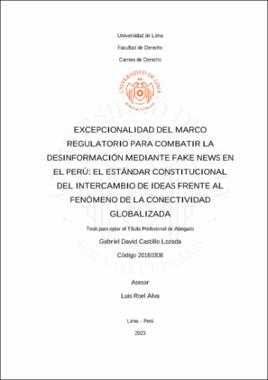| dc.contributor.advisor | Roel Alva, Luis Andrés | |
| dc.contributor.author | Castillo Lozada, Gabriel David | |
| dc.date.accessioned | 2023-10-30T19:15:44Z | |
| dc.date.available | 2023-10-30T19:15:44Z | |
| dc.date.issued | 2023 | |
| dc.identifier.citation | Castillo Lozada, G. D. (2023). Excepcionalidad del marco regulatorio para combatir la desinformación mediante fake news en el Perú: el estándar constitucional del intercambio de ideas frente al fenómeno de la conectividad globalizada [Tesis para optar el título profesional de Abogado, Universidad de Lima]. Repositorio institucional de la Universidad de Lima. https://hdl.handle.net/20.500.12724/19192 | es_PE |
| dc.identifier.uri | https://hdl.handle.net/20.500.12724/19192 | |
| dc.description.abstract | |n this thesis, the author analyzes the constitutional character of a regulatory framework against fake news in Peru in accordance with the constitutional block, the current legal standard of freedom of expression and its external limits. In this sense, it shows the deficiencies of the soft law, derived from the self-regulation of the media, proposing the application of other suitable means to combat disinformation in Peru. Likewise, it reviews the legislative advances in Comparative Law in order to contrast them in the light of the provisions of international treaties and revealing their excesses in relation to the right to freedom of speech, as well as the technical and legal deficiencies in the draft of the legal assumptions. Then, it explains the legal reasons for applying Criminal Law to fake news and partly discards the constitutional standard of the exchange of ideas as an obstacle to its regulation. Based on the points mentioned, it proposes a specific criminal regime to penalize the repeated dissemination of fake news, it defines legally and technically the phenomenon in question, establishes the assumptions for the criminal action’s exceptional fair, the conditions for the graduation of the penalty and the systematic interpretation in harmony with the sources of law. | en_EN |
| dc.description.abstract | En la presente tesis, el autor analiza el carácter constitucional de la legislación aplicable a las fake news en el Perú conforme al bloque de constitucionalidad, el estándar actual de la libertad de expresión y sus límites externos. En ese sentido, evidencia las deficiencias del soft law, derivado de la autorregulación de los medios de comunicación, proponiendo la aplicación de otros medios idóneos para combatir la desinformación en el Perú. Asimismo, revisa los avances legislativos en el Derecho Comparado, contrastándolos con las disposiciones en tratados internacionales, revelando sus excesos frente al derecho a la libertad de expresión, así como las deficiencias técnicas y jurídicas en la redacción de los supuestos de hecho. Luego, explica las razones jurídicas para aplicar el Derecho Penal a las fake news y descarta en parte el estándar constitucional del intercambio de ideas como obstáculo para su regulación. En atención a lo expuesto, propone un régimen penal específico para sancionar la difusión reiterativa de fake news, define jurídica y técnicamente dicho fenómeno, establece los presupuestos para la procedencia excepcional de la acción penal, las consideraciones para la graduación de la pena y la interpretación sistemática en armonía con las fuentes de Derecho citadas. | es_PE |
| dc.format | application/pdf | |
| dc.language.iso | spa | |
| dc.publisher | Universidad de Lima | |
| dc.rights | info:eu-repo/semantics/openAccess | * |
| dc.rights.uri | https://creativecommons.org/licenses/by-nc-sa/4.0/ | * |
| dc.source | Repositorio Institucional - Ulima | es_PE |
| dc.source | Universidad de Lima | es_PE |
| dc.subject | Desinformación | es_PE |
| dc.subject | Noticias falsas | es_PE |
| dc.subject | Disinformation | en_EN |
| dc.subject | Fake news | en_EN |
| dc.title | Excepcionalidad del marco regulatorio para combatir la desinformación mediante fake news en el Perú: el estándar constitucional del intercambio de ideas frente al fenómeno de la conectividad globalizada | es_PE |
| dc.title.alternative | Exceptionality of the regulatory framework to combat disinformation through fake news in Peru: the constitutional standard of the exchange of ideas facing the phenomenon of globalized convectivity | en_EN |
| dc.type | info:eu-repo/semantics/bachelorThesis | |
| thesis.degree.level | Título Profesional | es_PE |
| thesis.degree.discipline | Derecho | es_PE |
| thesis.degree.grantor | Universidad de Lima. Facultad de Derecho. | es_PE |
| dc.publisher.country | PE | |
| dc.type.other | Tesis | |
| thesis.degree.name | Abogado | es_PE |
| renati.advisor.orcid | https://orcid.org/0000-0002-9784-137X | |
| renati.discipline | 421016 | |
| renati.author.dni | 71433921 | |
| renati.level | https://purl.org/pe-repo/renati/level#tituloProfesional | * |
| renati.advisor.dni | 42725375 | |
| renati.juror | Chamochumbi Calderón, Luis Eduardo | |
| renati.juror | Luna Cervantes, Eduardo Javier | |
| renati.juror | Urbina Lovón, Erick Edwin | |
| renati.type | https://purl.org/pe-repo/renati/type#tesis | * |
| dc.subject.ocde | https://purl.org/pe-repo/ocde/ford#5.05.00 | |
| ulima.cat | 009 | |





